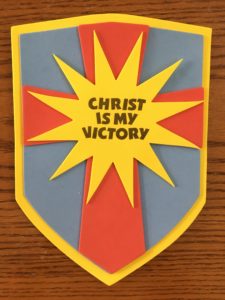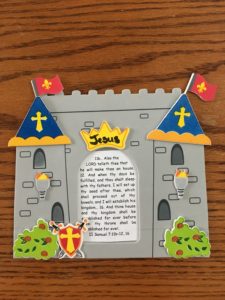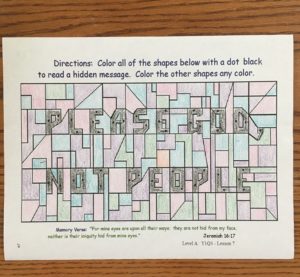
Luke 1:37
Jacob’s family moved to Egypt to be with Joseph. Before he died, he blessed each of his sons. When he came to Judah, he not only blessed him, but also made a prophecy concerning his descendants. “The sceptre shall not depart from Judah, nor a lawgiver from between his feet, until Shiloh come; and unto him shall the gathering of the people be” (Genesis 49:10). God knew that His people (the Israelites) would reject Him as their king, hundreds of years before they actually did. He had already chosen a tribe to be the kingly tribe – the tribe of Judah. Not only would the kings come from this family, but Jesus (Shiloh) would one day descend from this tribe (Judah). This was to be The King they were looking for: “… and unto him shall the gathering (looking for) of the people be.”
However, before Jesus came, remember David.
King David (from the tribe of Judah) sat at his house, and he spoke to Nathan the prophet. “… See now, I dwell in an house of cedar, but the ark of God dwelleth within curtains” (2 Samuel 7:2b). In the city of Jerusalem, David had set up a tent to house the Ark of the Covenant (which was a symbol of God’s presence among His people). David recognized God’s blessings, and he wanted to do something for God. God answered that night. David wanted to build a house for God that God declared was not really needed. The Ark of the Covenant had always rested in a tent. God reminded him that He had taken David from being a shepherd boy watching sheep to become the ruler over God’s people, Israel. God had always been with David, defeating David’s enemies, and He made David a great name. God went on to give David a great promise. “12. And when thy days be fulfilled, and thou shalt sleep with thy fathers, I will set up thy seed after thee, which shall proceed out of thy bowels, and I will establish his kingdom. 13. He shall build an house for my name, and I will stablish the throne of his kingdom for ever. 14. I will be his father, and he shall be my son. … 16. And thine house and thy kingdom shall be established for ever before thee: thy throne shall be established for ever” (2 Samuel 7:12-16). Notice that God promised to build David a house – not a house to live in, but a dynasty, a kingly lineage. This promise was twofold. God established David’s family as the kings of Israel. God also promised that David’s son would build Him a house. David prayed to God thanking Him and praising Him. David’s son, Solomon, became the next king of Israel, and he built a beautiful Temple for God.
Moreover, God would one day send His Son, Jesus, from David’s descendants: “… I will set up thy seed after thee …” (2 Samuel 7:12). Remember what Mary was told when the angel said that she would bring forth a Son. “30. And the angel said unto her, Fear not, Mary: for thou hast found favour with God. 31. And, behold, thou shalt conceive in thy womb, and bring forth a son, and shalt call his name JESUS. 32. He shall be great, and shall be called the Son of the Highest: and the Lord God shall give unto him the throne of his father David: 33. And he shall reign over the house of Jacob for ever; and of his kingdom there shall be no end” (Luke 1:32). When she did not understand, the angel told her, “For with God nothing shall be impossible” (Luke 1:37).
God did just what he promised He would do. We see it confirmed: “… he raised up unto them David to be their king; to whom also he gave testimony, and said, I have found David the son of Jesse, a man after mine own heart, which shall fulfil all my will. 23. Of this man’s seed hath God according to his promise raised unto Israel a Saviour, Jesus” (Acts 13:22-23). It is here that we see God kept his promise given to Jacob, David and Mary. It is Jesus, the Lion of the tribe of Judah. Read how Revelation describes Jesus: “… behold, the Lion of the tribe of Juda, the Root of David …” (Revelation 5:5).
More than that, Jesus came so that we could be restored as part of God’s family – only by faith in Jesus. “For ye are all the children of God by faith in Christ Jesus” (Galatians 3:26).
Have you looked unto Jesus, believing in Him by faith, and becoming a part of God’s Family?







